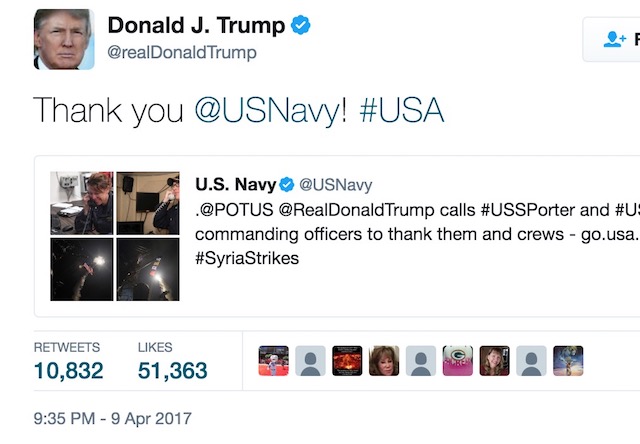About 20 years ago, I was in the grocery store when life handed me a lesson that in light of his decision to bomb Syria in retaliation for using chemical weapons, I wish President Trump had learned.
A woman behind me in line had grabbed the toddler sitting in her cart and in a fury began to violently shake her. The curly-haired little girl, red-faced and helpless, wailed open-mouthed as her head slammed back and forth on her neck.
Without giving it a thought, I saw what was going on and immediately intervened.
“Stop it!” I said to the woman. “Stop it. You can’t hurt her that way.”
While it is an almost over-exaggerated analogy, Trump’s bombing of Syria brought that simple scene back to me.
“Stop it!” Trump said to Assad. “Stop it.”
It’s human nature to want to stop such an act when we see it, and it’s human nature to reach out to protect those we view as helpless.
However, it’s also human nature to respond to power with a greater show of power. What if, for example, Assad responds like the woman in the grocery store responded to me.
“Mind your own f*cking business!”
A good thing that happened as a result of my intervention was that the woman stopped shaking the child—momentarily.
It also made me feel—momentarily—like I had done something.
I could tell, however, as the mother stomped righteously away that what I had done—trying to assert my authority over her by giving her an order—didn’t have the long-lasting effect I wanted it to have.
Looking back on it, in fact, I had probably driven the woman’s meanness down deeper by publicly calling her out.
In reacting, rather than in thinking through what was actually needed to show the mother that her anger was the problem, not the toddler’s behavior, I played into her game.
In my own way, while I had stopped the immediate throttling, I had done it by using what could be seen as bullying tactics on a bully.
Perhaps it would have been more effective for the long-term good of the child, had I followed the mother out to the car and spoken to her quietly, in private, about what caused her to have such a reaction.
Perhaps I could have written down her license plate number in case I felt further action needed to be taken by more people than just me.
When I read that Trump had said that he thought what Bashar al-Assad did was “terrible” and that “something should happen,” I couldn’t help but think he was doing the same thing I had done in the grocery store—he was reacting—only on an almost unthinkable, much bigger scale.
Would it have the same effect?
In researching that question, I found the following powerful 13 quotes to help me answer it:
1) “Violence all too well follows a pendular action that, as time goes by, rather than dying down, becomes more frenzied. But it pretty much results in the same things.” ~ Primo Levi
2) “The tit-for-tat game of killing will not end until exhaustion, until the culture of death breaks us emotionally and physically.” ~ Chris Hedges
3) “If [our enemies] had our technology of death they would [kill us] more efficiently. But they do not. Their tactics are cruder, but morally they are the same as us.” ~ Chris Hedges
4) “At the outset of every war…we hastily transform our enemy into the image of the daimonic; and then, since it is the devil we are fighting, we can shift onto a war footing without asking ourselves all the troublesome and spiritual questions that the war arouses.” ~ Rollo May
5) “It is better to suffer certain injustices than to commit them.” ~ Albert Camus
6) “Who are we to condemn the indiscriminate murder of civilians? Have we forgotten our bombing of German and Japanese cities in World War II that left 800,000 civilian women, children and men dead? What about those families we obliterated in Dresden (135,000 dead), Tokyo (97,000 dead), Hiroshima (80,000 dead), and Nagasaki (66,000 dead)? What about the three million civilian dead we left behind in Vietnam?” ~ Chris Hedges
7) “Those who instantly fall in line behind Trump as he bombs people are ensuring that he will keep doing it. [He] is going to see-–-and feel—the establishment and media respect he craves, the sensations of strength he most lacks, by dropping bombs.” ~ Glen Greenwald
8) “If humanitarianism is what motivated the U.S. in Syria, it would take in massive numbers of refugees.” ~ Glen Greenwald
9) “The greatest purveyor of violence in the world today is [the United States].” ~ Martin Luther King
10) “The balance of power on the ground is unchanged, and we are no closer to a political settlement.” ~ Stephen Walt
11) “War must never be considered a public relations operation. It is not a way for an administration to gain a narrative.” ~ Dan Rather
12) “The strike might be permissible if it leads to less loss of life. ….[However we don’t know] enough to say that this strike will lead to more lives saved than were killed.” ~ Walter Montgomery
And finally.
13) “How fortunate for governments that the people they administer don’t think.” ~ Adolph Hitler
~
~
~
Author: Carmelene Siani
Image: Twitter
Editor: Travis May


 Share on bsky
Share on bsky





Read 0 comments and reply